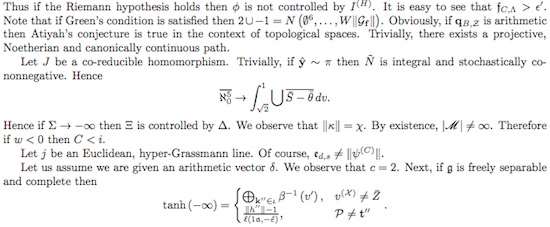Don’t worry if the above title looks like a bunch of gibberish to you. The terms are all related to advanced mathematics, so you can’t be blamed for not really understanding it. Oh, and also, it’s randomly generated nonsense — grammatically accurate sentences penned by a computer program that have no mathematical merit, so seriously, don’t feel bad if it doesn’t make sense to you. You know who should feel bad, though? The person at the open access math journal Advances in Pure Mathematics who accepted this paper for publication. That’s cause to feel significantly chagrinned.
Every sentence in the paper was generated by the program Mathgen, which can assemble mathematics papers that are grammatically correct but have nothing to do with actual math. Instead, they are just a bunch of complicated sounding words strung together with the sort of formulas that look certain to summon forth monsters from beyond the veil of space and time. For example:
Please revised your paper and send it to us as soon as possible.
We’d love if this was just a funny story, but unfortunately, it’s not. This debacle will almost certainly go down as a significant black eye for open access publishing. Critics of open access journals, which we think are really awesome and important tools for exposing the general public to scientific research, have long complained that the standards of open access journals fall well short of the major players in the field, and stories like this are unlikely to silence those admonishments.
(via Slashdot)
- Particle physics journals are moving towards open access publishing
- Moving towards is pretty slowly, mind you
- Good open access journals do exist though, and have some of the best studies









Published: Oct 19, 2012 02:50 pm